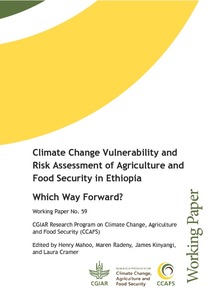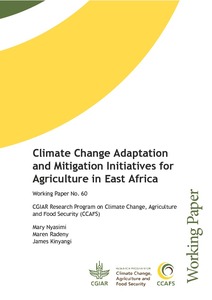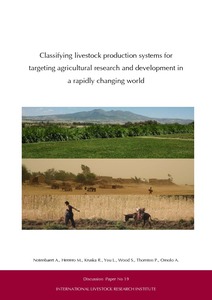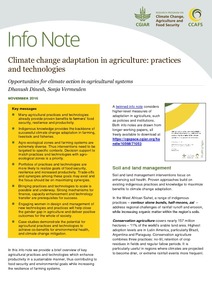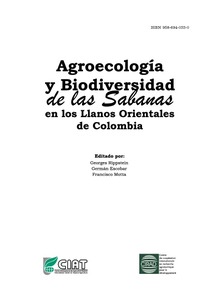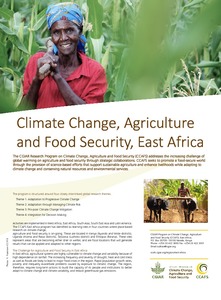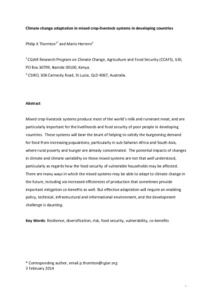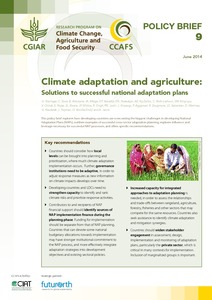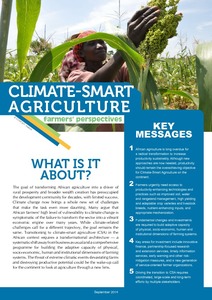Tierras de pastos
AGROVOC URI:
Climate change adaptation and mitigation initiatives for agriculture in East Africa
National governments across East Africa are in the process of formulating and implementing adaptation and mitigation strategies to assist farmers cope with climate change. These include formulating actions, frameworks and programs to address climate change and embedding these within the long-term national development plans.
Classifying livestock production systems for targeting agricultural research and development in a rapidly changing world
A myriad of agricultural and livestock production systems co-exist in the developing countries. Agricultural research for development should therefore aim at delivering strategies that are well targeted to the heterogeneous landscapes and diverse biophysical and socioeconomic contexts the agricultural production system is operating in. To that end, in the recent past several approaches to spatially delineate landscapes with broadly similar production strategies, constraints and investment opportunities, have been applied. The mapped Seré and
Climate change, agriculture and food security: a strategy for change
Agriculture – on which we all depend for our food – is under threat from climate change. There is no doubt that systems worldwide will have to adapt, but while consumers may barely notice in developed countries, millions of people in developing countries face a very real and direct threat to their food security and livelihoods. Even without climate change, many agricultural systems in developing countries are nearing crisis point. Feeding a rapidly rising global population is taking a heavy toll on farmlands, rangelands, fisheries and forests. Water is becoming scarce in many regions.
Climate change adaptation in agriculture: practices and technologies. Opportunities for climate action in agricultural systems
In this info note we provide a brief overview of key
agricultural practices and technologies which enhance
productivity in a sustainable manner, thus contributing to
food security and environmental goals while increasing
the resilience of farming systems.
A twinned info note considers
higher-level measures of
adaptation in agriculture, such
as policies and institutions. Updated: November 2016.
Both info notes are drawn from
longer working papers, all
freely available to download at
Claves sinópticas ilustradas para identificar especies de gramíneas comunes en la altillanura de los Llanos Orientales de Colombia
Climate change, agriculture, food security, East Africa
In East Africa, agricultural systems are highly vulnerable to climate change and variability because of high dependence on rainfall. The increasing frequency and severity of drought, heat and cold stress as well as floods are likely to lead to major food crises in the region. Rapid population growth rates, poverty and inequality exacerbate problems caused by exposure to climatic change. The region, therefore, requires long-term actions to build the capacity of its people and institutions to better adapt to climate change and climate variability, and reduce greenhouse gas emissions.
Climate change adaptation in mixed crop?livestock systems in developing countries
Mixed crop?livestock systems produce most of the world’s milk and ruminant meat, and are
particularly important for the livelihoods and food security of poor people in developing
countries. These systems will bear the brunt of helping to satisfy the burgeoning demand
for food from increasing populations, particularly in sub?Saharan Africa and South Asia,
where rural poverty and hunger are already concentrated. The potential impacts of changes
in climate and climate variability on these mixed systems are not that well understood,
Climate adaptation and agriculture: Solutions to successful national adaptation plans
The purpose of this brief is to share insights on agriculture and NAPs with national-level decision makers in developing countries and Least Developed Countries (LDCs), multilateral agencies, UNFCCC negotiators and donors. This brief explores how countries are overcoming the biggest challenges in developing NAPs, outlines examples of successful cross-sector adaptation planning, explores influence and leverage necessary for successful NAP processes, and offers specific recommendations.
Climate-Smart Agriculture: Farmers' Perspectives
Transitioning to climate-smart agriculture (CSA) in the African context requires a transformational architecture — a systematic shift away from business as usual and a comprehensive programme for building the adaptive capacity of physical, socio-economic, human and institutional dimensions of farming systems. Manyewu Mutamba of the Southern African Confederation of Agricultural Unions (SACAU) and Mainza Mugoya of the Eastern Africa Farmers Federation (EAFF) argue that African agriculture is long overdue for a radical transformation to increase productivity sustainably.
Climate readiness in smallholder agricultural systems: lessons learned from REDD+
The debate around the role that agriculture should play in mitigating climate change and sequestering greenhouse gases is politically complex and technically complicated. In many countries, and particularly in developing countries with a large smallholder population, the agricultural sector faces competing priorities, such as national food security goals, poverty alleviation, addressing natural resource degradation and adapting to the already visible effects of climate change.

